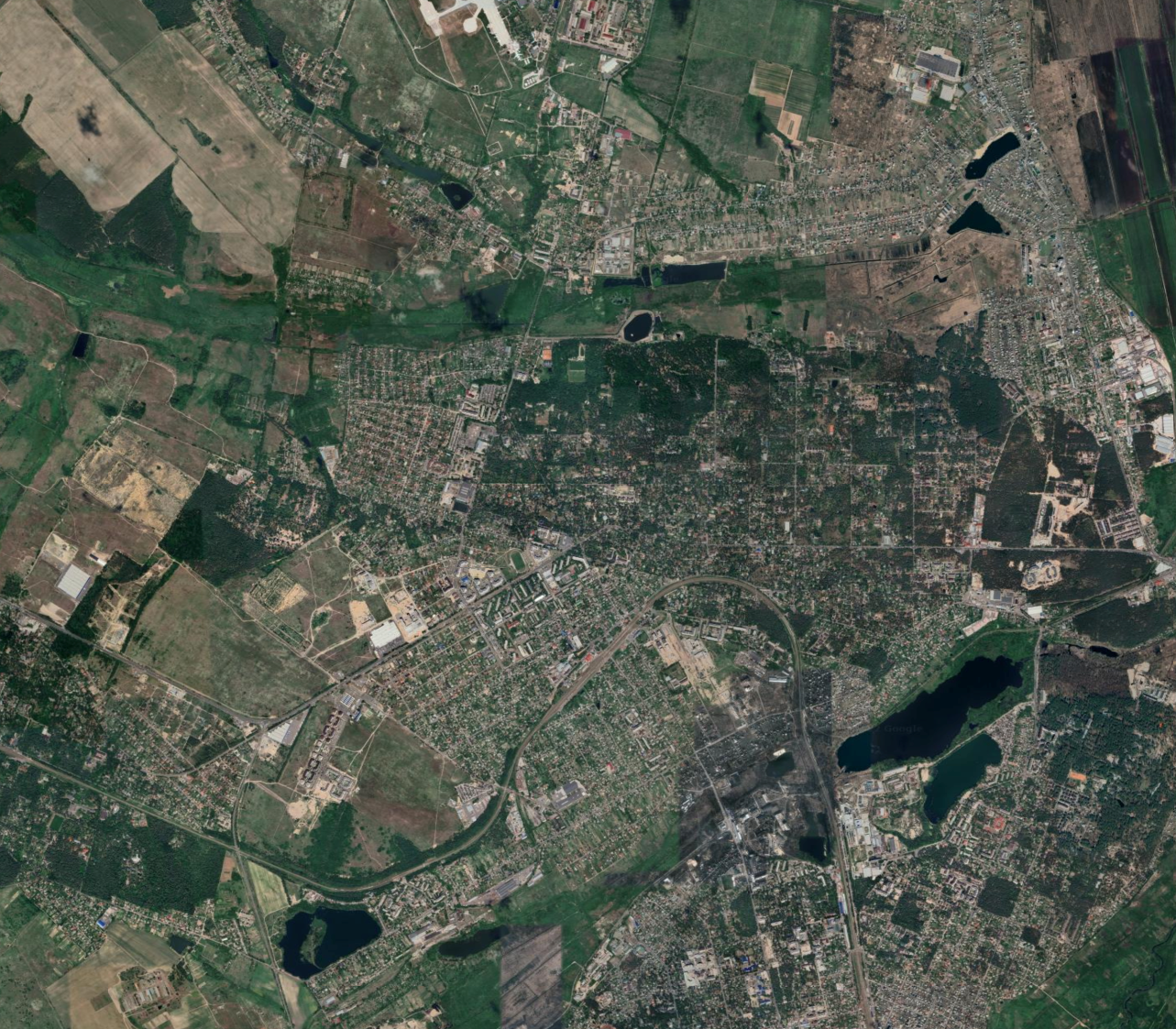Master 1
Visit. Prof. Anuschka Kutz
Campus Brussels / Remote
Engagement Urban Cultures
Academic year 2022-2023
The studio will run in a hybrid mode
operating roughly 50/50 on campus / remotely.
Studio Urban Field Lab
Projects for Bucha
Image from Google Earth.
“You can take away people’s homes, unfortunately, but not their dignity.”
The Ukrainian Architect Slava Balbelk in an interview with Dezeen, April 2022.
“Urbicide … is a fundamentally political matter since it represents the violent foreclosure of the possibility of the political.”
Martin Coward, Urbicide. The Politics of Urban Destruction, Routledge, 2009, p.43.
The atrocities committed in the Ukrainian city of Bucha and nearby Irpin during the occupation by Russian military forces from the end of February to the end of March 2022 is edged into our collective minds. Small cities and unassuming suburbs of Kyiv became a terrifying global news story.
“Before the invasion, Bucha was well known in Kyiv as a place to get away, to drop kids off at the summer camp for a couple of weeks or take them to a ropes course called the Crazy Squirrel. Now Bucha is a byword for war crimes, like Srebrenica or My Lai,” reports Simon Shuster (Time, April 13 2022).
Bucha had a population of about 36,000 before the conflict. Today it is difficult to ascertain how many people are living in Bucha as many residents have sought refuge elsewhere. The atrocities will stay with Bucha. The scars run deep, both in terms of physical but also psychological trauma and destruction. The war is not over and the situation in Ukraine remains uncertain.
Despite this, Bucha is not just a tragedy edged into our memory, but Bucha is a living city, with people and livelihoods.
How will the city move on from this tragedy without leaving the tragedy behind? What are immediate needs, what are projected futures? What can the international community of urban thinkers and architects contribute?
“Reconstruction forces us to think about life beyond, or in spite of, war. Reconstruction forces us to see things from the ground and from the perspective of the community, rather than from a distance or above. Reconstruction forces us to consider longer temporalities of transformations, rather than short-lived events cultivated by the media.”
Alessandro Petti (2019), ‘Destruction, Displacement, Reconstruction, and Return’ in Hilal, Sandi and Alessandro Petti Permanent Temporariness, Stockholm: Art and Theory Stockholm, p.348.
“It makes a big, big difference in reconstructing a city if there is proper local input,” Pullan says. “There’s just no point in doing a reconstruction if you’re blind to the political and social realities of the city.”
Prof. Wendy Pullan in an interview with France24, featured on 16 May 2022.
Studio Urban Field Lab will not mandate what will happen in Bucha, this will ultimately be decided by Ukrainians themselves. Our aim is to develop ideas for Bucha, for the immediate future and the wider future in a time of great uncertainty. Our work is not about creating fixed masterplans or importing ready-baked visions, but about assembling spatial and strategic ideas in diverse scales, timeframes and scope, as a contribution to a growing international archive of ideas.
Collaborations
The studio will work in collaboration with the Ro3kvit, Urban Coalition for Ukraine (www.ro3kvit.com), an open-source network of organizations and specialists – both Ukrainian and International – working on a non-profit basis. As a member of its Task Force, I will provide the link between our studio work and the NGO. Ukrainian and international members of the NGO, in particular members of the working group on Bucha within Ro3kvit, will link into the studio work.
We are also currently working on a possible exhibition / conference on Architecture of Peace in Sept 2023 at Venice International University. This would provide you with an international framework to exhibit your work.
We will work on three core pieces of work
- Analysis of an evolving situation. This will result in a Collective Spatial Compendium.
- Collective urban thinking to create starting points for potential scenarios in uncertain times and to coordinate studio-based ideas, expressed through large-scale interactive collective drawings / models.
- Small-group projects that tackle specific ideas and themes.
The studio will work in a hybrid mode. We will work remotely as well as on site at the Brussels campus, meeting collectively on campus roughly every fortnight and working remotely the remaining time. We will meet on a weekly basis either on-site or remotely. The dual mode will permit us to integrate diverse online tools, such as Miro which we will use to generate an on-going digital archive of your developing work and to communicate with international Ro3kvit members and their ongoing work. The studio language is English.
The studio Projects for Bucha runs in parallel with the Master Thesis Studio Fragilities. There will be peer-review moments between both studios to provide opportunities for exchange and discussion beyond your studio.
Please refer to the extended Brief for more info and join the studio presentations and remote Q&A.
I will run an additional remote Q&A on Wednesday the 1st of February at 10.00 (CET). I am happy to address any questions you may have about the studio and can give more background. Please join using this link:
https://eu.bbcollab.com/guest/237cbe6108954e7eab1dd7b3deb049d9
You can also email me at: anuschka.kutz@kuleuven.be See previous work here https://www.blog-archkuleuven.be/urban-field-lab/
Thanks

